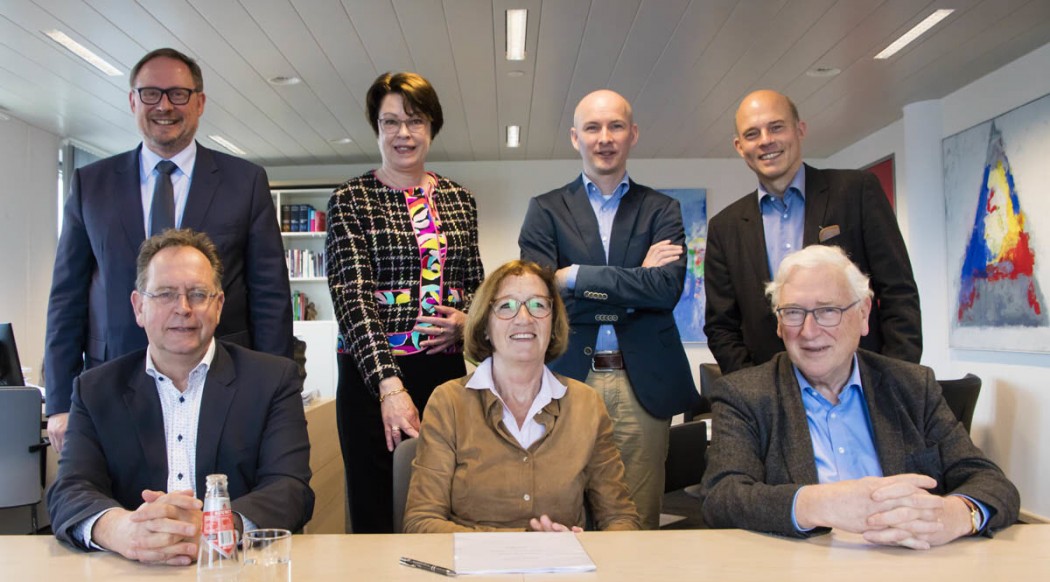Major subsidy for ‘Moving without Pain’ project
Maastricht UMC+ is to start an extensive research project on the treatment and prevention of arthrosis. Stichting De Weijerhorst has helped make the ‘Moving without Pain’ project possible with a subsidy of one and a half million (as part of a total budget of 2.5 million euros). ‘We want to tackle arthrosis at the source and do more than just treat the symptoms’, said Dr Tim Welting who, together with Dr Pieter Emans and Prof Lodewijk van Rhijn, will be coordinating the study over the next five years.
Arthrosis is a major societal problem. No less than one and a half million people in the Netherlands currently suffer from the condition. Although the risk of arthrosis increases with age, increasing numbers of younger people are also facing this disease. There is no real treatment available. Medication focuses purely on pain relief, and joint replacements are, in fact, also a temporary solution as prostheses are prone to wear and tear. Scientists at Maastricht are currently working on a cell-based solution that tackles arthrosis at the source.
Irreversible process
Arthrosis is a complex condition of the joints in which age-related deterioration of the cartilage plays a primary role. Cartilage cells normally produce supple and smooth cartilage. As the body ages, however, these cells become less efficient, resulting in poorer quality cartilage and the development of arthrosis. Eventually, the cartilage may even disappear altogether. Arthrosis and the loss of cartilage in the joints cause significant pain and discomfort, making pain relief or a joint replacement necessary. In laboratory experiments, the Maastricht research team discovered how the loss of healthy cartilage can be prevented.
Prevention
The Dutch Arthritis Foundation financed the pioneering research that led to the discovery of a specific substance that can maintain cartilage plasticity. ‘If someone were to develop arthrosis symptoms, we could administer this substance as a preventative measure, and in so doing inhibit the progression of arthrosis’, said Welting. The scientists will test their ideas further in practice in the new research project. There are also indications that in addition to providing pain relief, one particular anti-inflammatory also has a beneficial effect on the health of cartilage cells. The scientists will also be examining this in the ‘Moving without Pain’ project.
Worthwile project
Prof. Schonis, Chair of Stichting De Weijerhorst, emphasised the importance of supporting this type of medical scientific research: ‘We consider issues such as stimulating medical progress to be our social responsibility. Arthrosis is a growing problem in today’s society. “Moving without Pain’ is an innovative project that contributes towards preventing the condition, so that we can all age in a healthy and pain-free manner. As a foundation, we are therefore more than happy to provide our support.’ Orthopaedic surgeon Prof. Lodewijk van Rhijn is delighted with the support from Stichting de Weijerhorst: ‘We can now take a real step towards treating arthrosis at the source. This could not only relieve a great deal of suffering, but also prevent the need for surgery, for example. In turn, this would help reduce health care costs.’

Above (f.l.t.r.): Mr Cobbenhagen (director Brightlands Maastricht Health Campus), Mrs Sanders (director Stichting de Weijerhorst), Mr Welting (orthopedics, Maastricht UMC+), Mr Van Rhijn (chief orthopedics, Maastricht UMC+). Below (f.l.t.r.): Mr De Vries (board member Maastricht UMC+), Mrs Van Dieijen-Visser (chief board member Maastricht UMC+), Mr Schonis (chief board member Stichting De Weijerhorst)
This press release has been issued by the Maastricht University Medical Centre (MUMC+).
More information at: www.mumc.nl.
Also read
-
Researchers at the Alzheimer's Centre Limburg, Maastricht University, and Maastricht UMC+ developed an online tool for caregivers (mumc+ news).
-
Certain types of chemotherapy cause a greater degree of nerve damage than was previously thought (PhD conferral Tonneke Beijers).
-
The selective withdrawal of red blood cells as a treatment for haemochromatosis (iron overload) is an effective and patient-friendly alternative to phlebotomy (bloodletting) (PhD conferral Eva Rombout).

